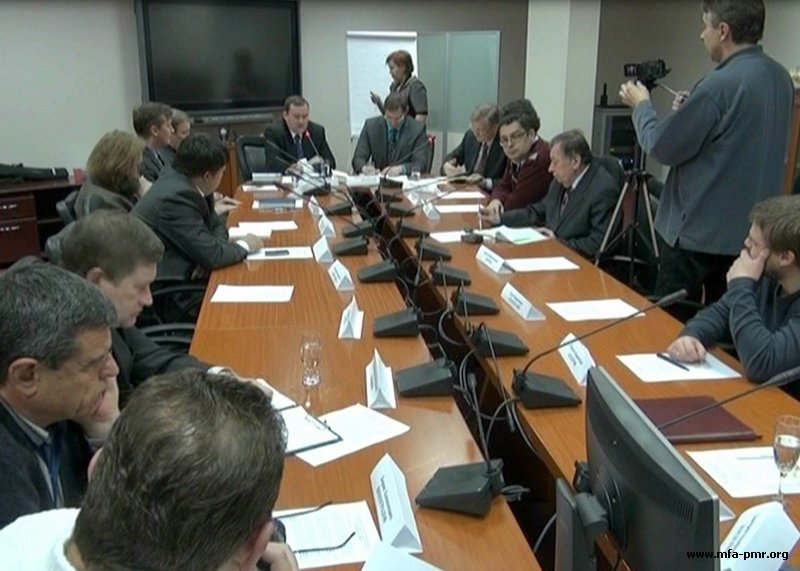On November 24 in the Institute of Dynamic Conservatism (IDC) in Moscow a broadened sitting on the topic “Pridnestrovien problem: historical background, contemporary situation, prospects. Russian factor and position of the RF.”
Minister of Foreign Affairs of the PMR Vladimir Yastrebchak, Deputy Foreign Minister Vitaliy Ignatiev and Director of Institute of History, State and Law of the T.G. Shevtchenko Pridnestrovien State University Iliya Galinskiy participated in expert event from the Pridnestrovien side.
Director of IDC, philosopher Vitaliy Averianov, Director on programs of IDC Mikhail Demurin, expert of the Institute Boris Vinogradov and Konstantin Cheremnyh, public figure, Extraordinary and Plenipotentiary Ambassador of the RF Valentin Falin, Co-chairman of “Narodny Sobor” Inter-Regional Public Movement Vladimir Homyakov, senior staff scientist of the Institute of Slavonic Studies of the Russian Academy of Sciences Oleg Nemenskiy, executive secretary of International Committee of “International Russia” Initiative Roman Gazenko, editor-in-chief of Western editorial staff of REGNUM Informational Agency Sergey Kolerov, editor-in-chief of “Baltic World” journal Dmitriy Kondrashov, writer and publicist Maksim Kalashnikov, documentary film maker Boris Kostenko, manager of research programs of “Historical memory” Foundation Vladimir Simindey, culture expert Alexander Semeniuk were among Russian participants.
Unbiassed consideration of topical aspects of contemporary situation around Pridnestrovie and inside the republic with purpose of elaboration of consolidated and effective position of expert community of Russia and Pridnestrovie for preservation of close friendly connections and development of bilateral cooperation became the main objective of activity of public and expert forum.
During his speech, Head of the PMR's foreign office Vladimir Yastrebchak told about the fundamentals of identity of multinational Pridnestrovien nation and premises of restoration of Pridnestrovien statehood.
Minister minutely described principle moments of negotiation process for 18 years and evaluated contemporary status of negotiations, characterizing them as “jumping in place in order to make a step after rock oneself to and fro”. According to Pridnestrovien diplomat's opinion, real steps and progress are possible only in those spheres, which make it possible to avoid politicization: the resumption of full-fledged railroad connection, solving of the problem of interaction of law-enforcement bodies, etc. However, considering diametrally opposite positions of the sides, it is very difficult to talk about the political constituent.
Touching upon interests of the Russian Federation in Pridnestrovie, Vladimir Yastrebchak marked out such fundamentally significant for Russia directions, as humanitarian cooperation and support of 160 thousand of Russian citizens, economical interests of Russian owners of enterprises in the republic, interests in the sphere of regional security and valuable experience of successful Peacebuilding operation. Diplomat emphasized, it is in Russian interests to strengthen Pridnestrovie as living example, a kind of “showcase” for international partners, showing the life of those, who demonstrate their devotion to Russia from decade to decade.
In his speech, Vitaliy Ignatiev highlighted key aspects that characterize interests of leading international actors in relation to Moldova and Pridnestrovie, as well as level of their actual impact in this region of Europe.
The diplomat paid special attention to the pressing problem connected with remaining mechanism of politico-economic pressure on Pridnestrovie on the part of Moldova which lies in attaching foreign economic activity of the Pridnestrovien enterprises to customs-legal and economic system of the neighbouring state.
Vitaliy Ignatiev drew attention of Russian experts to the present-day military and political processes around Pridnestrovie, underlying that the only real factor of Russia's regional presence, as decades ago, remains Pridnestrovie that has all necessary to become integral part of the Eurasian Union and element of stability of this part of Europe.
Russian political analyst Ilya Galinsky in his speech conducted comparative analysis of strategic orientation of the Republic of Moldova and activity of Pridnestrovie aimed at realization of the Russian vector supported by national referendum on September 17, 2006.
Russian political and public figure and diplomat Valentin Falin paid attention to exceptional importance of the given discussion from the viewpoint of learning lessons of history. He stressed that Pridnestrovie should be perceived by modern Russia as Kaliningrad region, and there can be no other analogies.
Publicist Maksim Kalashnikov characterized relations of Russia towards Pridnestrovie in the course of many years as a policy of “bifurcation”. He expressed his conviction on the necessity to maintain Russian presence in Pridnestrovie as future border of the Eurasian Union.
Director on programs of IDC, diplomat and writer Mikhail Demurin emphasized that the problem of responsibility of Russia as a successor of the USSR is of particular importance. According to expert, Russia failed to realize its duty of a mediator in the Moldo-Pridnestrovien negotiation process in 2006. Similar situation remained in subsequent years when the Russian Federation as a guarantor country and mediator was to precondition resumption of negotiations by turning the situation back to “status-quo” which had existed before blockade of Pridnestrovie was introduced.
Summing up the results of expert discussion, Director of the Institute of Dynamic Conservatism Vitaliy Averianov critically assessed attempts to impose on Russian public opinion rhetoric on the possibility to hold Moldova in the field of Russian influence at the cost of the “compromise” on Pridnestrovie.
In the words of the political analyst, the main task of the joint Russian-Pridnestrovien expert work is the break of a “discourse paralysis” and the need to convey information to the public, and Prime-Minister of Russia Vladimir Putin about real current situation around Pridnestrovie. In his view, to make it be heard, a kind of mental “explosion” is required.
Participants of the sitting discussed top-priority steps and agreed upon a number of practical actions for achieving goals which were laid down.








